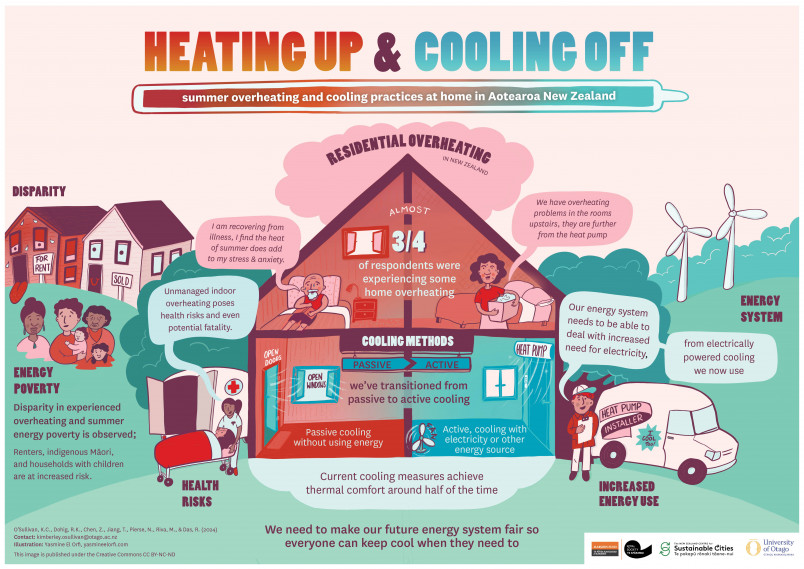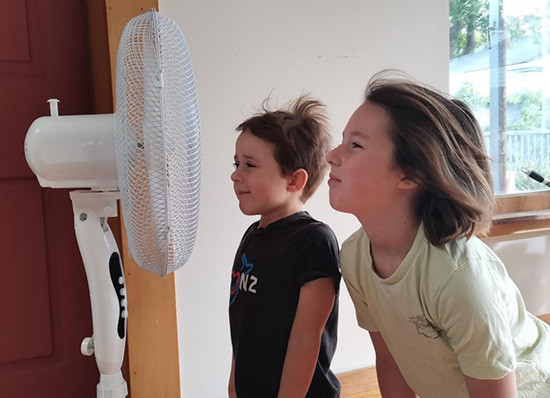
This image is published under the Creative Commons CC BY-NC-ND and enables reusers to copy and distribute the material in any medium or format in unadapted form only, for noncommercial purposes only, and only so long as attribution is given to the creator.
Background
Kimberley O'Sullivan has received a Marsden Fund Council grant from Government funding to conduct research on New Zealanders’ summertime home energy use as the country adapts to a warming climate.
Six of New Zealand’s top ten warmest years occurred between 2010 and 2019, and increasingly frequent and severe heat days will feature in our future climate. But how do New Zealanders manage summer heat flows in their homes? Current evidence suggests households are turning to mechanical cooling. How might we need to challenge these evolving energy behaviours to curb summer emissions and energy demand in Aotearoa?
This innovative mixed methods research, administered by the Royal Society of New Zealand, is a three-year study which will combine data from a survey, multigenerational interviews, temperature and humidity dataloggers, and energy-use diaries to form recommendations for householders and policy on sustainable practice for summer heat management.
Aims and Objectives
This research employs a multi-phased, sequential, mixed methods design to investigate how New Zealanders manage summer heat flows at home, and how this has changed over time. The goal is to describe in depth the present situation, identifying any shift towards using active cooling that is suggested by minimal current evidence on heatpump use, and ultimately to provide recommendations to households and policymakers that will support sustainable energy use.
- To understand how New Zealanders currently manage summer heat and thermal comfort at home
- To understand the drivers of change in summer heat flow management at home
- To explore home cooling practices and how these may have changed within and between families over time
- To integrate data from a postal survey, multi-generational family interviews, temperature and relative humidity data loggers and energy-use diaries to richly describe the energy cultures of summer heat flow management at home in Aotearoa
- To provide evidence-based recommendations to policymakers and householders based on the energy cultures identified that will support sustainable energy use and community resilience to summer heat in Aotearoa
- To disseminate the results of this critical research through a mix of academic and public engagement outputs
This study will provide ‘storied’ accounts, as well as quantitative and environmental data, to give a broad picture of how households manage summer heat at home across Aotearoa, which is critical for providing relevant advice to householders and policies across the energy, building, and urban development domains. The results of this novel study are expected to be of national and international interest as we move towards a just energy transition in a changing climate.
Updates
September 2024
We’ve officially come to the end of our first Heating Up, Cooling off research project after successfully undertaking three different surveys giving us a first look at Aotearoa’s experiences with summer heat at home.
We’d like to express our thanks again to the Marsden fund for supporting this work, and also to all the participants who made this research possible.
Links to all publications from this work, including news stories, will be updated here – check back, or follow us to stay informed. For now, here is a summary of what we’ve found during the Heating Up, Cooling Off project:
Our environment is changing with 2023 the hottest year since climate records began and 2024 set to break those records again. As our climate warms, our risk of indoor overheating during summer is growing in Aotearoa New Zealand, but we have very little information about this experience at present. This study used a mixed methods design to investigate how New Zealanders manage summer heat at home, and how this has changed over time. The goal was to describe in depth the present experience of indoor overheating, identify any shift towards using active cooling suggested by the limited available evidence on heatpump use, and ultimately to provide recommendations to households and policymakers that will support sustainable energy use.
We used a postal survey undertaken in summer 2021/2022 which targeted areas that often experience hot summer temperatures to understand the current experience of overheating. Our results show that overheating occurs in almost three quarters of homes in these regions. While most people were using passive cooling methods like opening doors and windows, active cooling methods that use electricity were being used by almost three quarters of our respondents. Heatpumps are now used widely across Aotearoa, and of the 65% who had a heatpump, 72% were using these for cooling or air conditioning. These research findings indicate that an energy transition to active cooling has already occurred in Aotearoa, even though we have a relatively temperate climate compared to other countries. This shift to using more energy intensive active cooling will increase our summertime residential energy demand and emissions. We urgently need to improve housing thermal performance and consider behavioural change interventions that prioritise using passive cooling approaches.
Our research also identified significant disparities in experienced overheating, as well as access to and the affordability of adequate cooling to achieve comfortable and healthy indoor temperatures. This inequitable summer energy poverty requires further investigation and urgent policy action. Of particular concern, we found that whānau Māori, renters, and households with children were at particular risk of overheating and summer energy poverty, affecting their health and wellbeing.
We also used qualitative surveys to gather stories about overheating and found that tāngata whaikaha / disabled people face particular challenges from indoor overheating. Disabled people described to us difficulty maintaining thermal comfort and significant health impacts of high indoor temperatures, with barriers including intersectionality, the interpersonal dynamics at play within households, and the accessibility barriers caused by poor thermal conditions of the wider build environment. Caregivers of tamariki / children described barriers to doing what they would like to keep their tamariki / children cool. They especially talked about the cost and access (both transport and distance) to pools or other swimming spaces, the cost of air conditioning, water pollution preventing them from using natural waterways to cool down, and sunburn risk.
Our research on indoor overheating and summer energy poverty in Aotearoa New Zealand continues.
March 2023
Keeping Tamariki Cool

We’ve had a busy start to the year developing two qualitative surveys looking into how households keep their homes cool during the heat of summer. The first of the two, Keeping Tamariki Cool, was developed in collaboration with Erana, a summer tauira from Pūhoro STEMM academy who worked with us over the Christmas period. This project is focusing on whānau with tamariki at home. The questions explore how whānau used to keep cool when they were young; what they do now to keep their tamariki cool; and what they like for the future.
Our second qualitative survey Staying Cool at Home: Disabled Persons Experiences of Indoor Summer Heat in Aotearoa NZ is exploring how disabled persons, tāngata whaikaha Māori and those with long-term health conditions, keep cool during the heat of summer.
We are interested in how people currently keep cool; how well dwellings support thermal needs in summer; and whether there are any barriers to preferred cooling practices.
March 2022
Summer has officially ended in Aotearoa and as expected we have seen some climate extremes (hyperlink to this article please https://www.rnz.co.nz/national/programmes/checkpoint/audio/2018832503/cities-hotter-less-liveable-stark-warning-from-climate-report). We have been busy with our postal survey asking people across Aotearoa to tell us how they find the heat at home during summer and what they do to manage hot homes. Thank you to everyone who has helped with our survey. We’re working on a report and will share the results soon.
December 2021
Summer 2021/2022 has arrived with unsurprising forecasts for above average temperatures across Aotearoa New Zealand. We’re getting ready to launch our postal survey in regions that regularly experience heat extremes for the first stage of our data collection. If you receive a postcard and survey pack from us, please complete our survey to help tell us how you manage summer heat at home and if you choose we can send you a $20 supermarket voucher. We’re looking forward to getting our first insights into how you keep cool at home in summer Aotearoa.
For more information
For more information you can contact Dr Kimberley O’Sullivan [email protected]